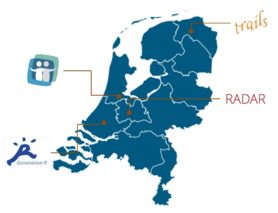News
Intergenerational transmission of parenting and psychopathology
Written by Sanne Geeraerts & Susan Branje (Utrecht University)
How, why, and under which circumstances are behaviours, traits and other characteristics transmitted from one generation to the next? And how should we study these transmission processes? In this review, we look at mechanisms of intergenerational transmission and describe what is known about the situations under which transmission weakens or strengthens. Next, we focus on methodological considerations to study intergenerational transmission and introduce the four cohort studies in work package 3: Generation-R, Netherlands Twin Register, RADAR and TRAILS.
Intergenerational transmission
Intergenerational transmission can arise through genetic processes, cultural transmission, and through the interplay between genetics and the environment. We review various forms of cultural transmission processes, such as modelling, in which children observe and imitate parents’ behaviours. We discuss that shared genes may affect child and parent behaviour directly, but may also be correlated with the social environment, through gene-environment correlation (rGE) and epigenetic processes.
Methodological considerations
There are a plethora of study features that make a study well-designed to examine intergenerational transmission. For instance, as intergenerational transmission assumes a temporal ordering, longitudinal studies across multiple generations are needed. Preferably, traits and behaviours are measured repeatedly in both generations. In addition, studies need to include information of both fathers and mothers, to be able to examine paternal and maternal intergenerational transmission. Moreover, genetically informative designs, including those with multiple offspring, the children-of-twins design, multiple genotyped generations or the virtual parent design, are needed to disentangle the contributions of genetic and nongenetic transmission and to understand interactions between genetic and nongenetic factors.
Four cohort studies
 The review presents the four large Dutch longitudinal cohort studies within work-package 3 of the Consortium on Individual Development. Together, these studies address many methodological challenges described in this review. All four studies rely on a longitudinal design, have prospective G2 and G3 data, and measured the concepts of interest in both G2 and G3 participants, and included both fathers and mothers. In addition, the four studies come with unique methodological strengths. Notable strengths are for instance the twin design of NTR and the prenatal measures in Generation R and TRAILS. RADAR and TRAILS have intensive repeated prospective data on parenting practices of two generations of parents and are therefore, amongst others, particularly suitable to examine intergenerational transmission of parenting.
The review presents the four large Dutch longitudinal cohort studies within work-package 3 of the Consortium on Individual Development. Together, these studies address many methodological challenges described in this review. All four studies rely on a longitudinal design, have prospective G2 and G3 data, and measured the concepts of interest in both G2 and G3 participants, and included both fathers and mothers. In addition, the four studies come with unique methodological strengths. Notable strengths are for instance the twin design of NTR and the prenatal measures in Generation R and TRAILS. RADAR and TRAILS have intensive repeated prospective data on parenting practices of two generations of parents and are therefore, amongst others, particularly suitable to examine intergenerational transmission of parenting.
These four large prospective longitudinal cohort studies have joined forces to examine the extent to which genetic and non-genetic transmission occurs, why and how transmission occurs, and what factors may break the cycle of transmission.
More information
Branje, S., Geeraerts, S., de Zeeuw, E. L., Oerlemans, A. M., Koopman-Verhoeff, M. E., Schulz, S., Nelemans, S., Meeus, W., Hartman, C. A., Hillegers, M. H. J., Oldehinkel, A. J., & Boomsma, D. I. (2020). Intergenerational transmission: Theoretical and methodological issues and an introduction to four Dutch cohorts. Developmental Cognitive Neuroscience. https://doi.org/10.1016/j.dcn.2020.100835
This paper is part of a special issue in Developmental cognitive neuroscience about the Consortium on Individual Development. For an overview of all papers go to here
